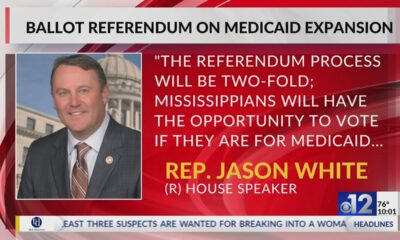Mississippi Today
Q&A: Explaining the health care coverage gap
Lawmakers and advocates regularly refer to Mississippians without health insurance who are in the “coverage gap.” But what is the coverage gap, why does it exist and how does it relate to Medicaid expansion?
Medicaid is a federal-state program that provides health coverage to millions of people in the U.S., including low-income adults, children, pregnant women, elderly adults and people with disabilities. States administer the program, which is funded by both states and the federal government. Mississippi participates in the traditional Medicaid program, but the Legislature is debating two differing proposals that would expand Medicaid.
The coverage gap refers to a certain group of uninsured people in states that have not expanded Medicaid under the Affordable Care Act, the federal health reform law enacted in 2010 under the Obama administration. The law sought to make health insurance affordable and accessible to more people and provides subsidies that lower costs for households with incomes between 100% and 400% of the federal poverty level, or between $18,210 and $72,840 in annual income, respectively, for an individual.
The Affordable Care Act also expanded Medicaid eligibility to adults under 64 years of age with income up to 138% of the federal poverty level – or $20,782 annually for an individual in 2024. But a U.S. Supreme Court ruling in 2012 made expansion optional, creating the “coverage gap” in states that did not opt to expand the federal-state program.
What is Medicaid?
What is the coverage gap?
Why does it exist?
In Mississippi and the nine other states that have not expanded Medicaid, there is a gap between people whose income is not low enough to qualify for non-expanded Medicaid but less than 100% of the federal poverty level, or about $15,000 a year for an individual, to qualify for subsidized insurance through the federal marketplace. To qualify for Medicaid in Mississippi under current regulations, one's household income must be less than 28% of the federal poverty level, or a mere $7,000 annually for a family of three. Non-disabled childless adults are not eligible for Medicaid unless they have another qualifying condition.
How many people fall into the coverage gap?
Roughly 74,000 Mississippians fall into the coverage gap, according to a recent KFF study. Nationally, the number is 1.5 million people.
What is Mississippi's uninsured population?
Mississippi had one of the highest uninsured rates among working-age people in the country in 2022 at 16.4%, according to the U.S. Census Bureau's American Community Survey.
Are people in the coverage gap employed?
In 2019, of the 178,000 uninsured Mississippians making below 138% of the poverty level, the majority – nearly 61% – were either working or looking for work. Many of those not in the labor force are unable to work due to a mental health or medical condition; lack of transportation; caring for a family member or recent incarceration, among other circumstances. More recent years' data has been skewed because of the COVID-19 pandemic and extended Medicaid coverage for people who would not have otherwise been eligible.
Nationally, according to KFF, the most common jobs of people in the coverage gap are cashiers, cooks, waiters-waitresses, construction/laborers retail salespeople and janitors.
What keeps businesses from offering health insurance to its employees or from offering it with reasonable deductibles?, according to Hilltop Institute at the University of Maryland, Baltimore County
Larger employers – those with over 50 employees – are required to offer health insurance to their employees or pay a penalty. For smaller employers, offering health insurance is not mandatory. And because it is often more expensive, smaller employers will offer benefits with higher deductibles and copays in order to reduce their own expenses. So those employed at a small business either may not have the option of health insurance or may choose to opt out because of cost.
Nearly 69% of private businesses in Mississippi employ fewer than 50 employees, according to the Agency for Healthcare Research and Quality. It's up to 95% when public employees are included, according to Hilltop Institute at the University of Maryland, Baltimore County.
How many people would the House and Senate plans make eligible for Medicaid, and how many of those are in the coverage gap?
The House plan – which is traditional expansion under the Affordable Care Act and would make Mississippi eligible for hundreds of millions of federal dollars – is estimated to cover 200,000 Mississippians. That would include people in the coverage gap and others.
The Senate plan – which is not traditional expansion and does not qualify the state for the federal match – would insure about 40,000 Mississippians. This would include only people in the coverage gap, or only those making up to 99% of the federal poverty level.
This article first appeared on Mississippi Today and is republished here under a Creative Commons license.
Mississippi Today
On this day in 1937


May 1, 1937

Jackie Ormes became the first known Black cartoonist whose work was read coast to coast through the major black publication, the Pittsburgh Courier.
Her cartoon told the story of Torchy Brown, a Mississippi teenager who sang and danced her way from Mississippi to New York City, mirroring the Great Migration, when millions of African Americans trekked from the South to the North, Midwest and West.
In 1945, her cartoon, “Patty-Jo ‘n' Ginger,” started. The strip proved so popular that department stores sold Patty-Jo as a doll. Five years later, Torchy returned, this time as a confident and courageous woman who dared to tackle such issues as race, sex and the environment. Readers applauded this strong model of what young Black women could be.
In 2014, she was inducted into the Black Journalists Hall of Fame and was later featured by Google on its search page.
This article first appeared on Mississippi Today and is republished here under a Creative Commons license.
Did you miss our previous article…
https://www.biloxinewsevents.com/?p=354343
Mississippi Today
Work requirement will likely delay or invalidate Medicaid expansion in Mississippi
The final version of Medicaid expansion in the Legislature could leave tens of thousands of uninsured, working Mississippians waiting indefinitely for Medicaid coverage – unless the federal government makes an unprecedented move.
The compromise lawmakers reached minutes before a legislative deadline on Monday night makes expansion contingent on a work requirement. That means even if both chambers pass the bill, the estimated 200,000 Mississippians who would qualify for coverage would need to wait until the federal government, under either a Biden or Trump administration, approved the waiver necessary to implement a work requirement – which could take years, if ever.
Lawmakers in favor of the work requirement have not been open to allowing expansion to move forward while the work requirement is in flux. The House bill proposed expansion be implemented immediately but included a “trigger law” similar to North Carolina's. The “trigger law” mandated that if the federal government ever changed its policy on allowing states to implement a work requirement, Mississippi would move to implement one immediately.
Senator Brice Wiggins, R-Pascagoula, one of the Medicaid expansion conferees, posted on social media “if CMMS wants people covered then it will approve (the work requirement). Nothing prevents them from approving it other than POTUS/CMMS philosophy.”
But even in states where a work requirement was approved, litigation ensued, with the courts finding the approval of the work requirement unlawful for a number of reasons, according to a KFF report.
Senate Medicaid Chairman Kevin Blackwell, R-Southaven, did not respond to Mississippi Today by the time the story published.
Will a Biden – or Trump – administration approve the work requirement?
The Biden administration has never approved the waiver necessary for a work requirement and has rescinded ones previously granted under the Trump administration. Waivers granted under the Trump administration were not granted under the current circumstances as Mississippi.
Mississippi Today reached out to the Centers for Medicare and Medicaid Services for comment but did not hear back by the time of publication.
Joan Alker, Medicaid expert and executive director of Georgetown University's Center for Children and Families, explained that the Trump administration has never approved a work requirement up front for a traditional expansion plan like Mississippi's.
In states like Kentucky and Arkansas, Alker explained, the Trump administration approved work requirements as a means of limiting already-existing expansion plans. In Georgia, an outlier state that remains in litigation with the Biden administration for rescinding the state's work requirement waiver, the Trump administration approved a work requirement for a plan that isn't considered full “expansion” under the Affordable Care Act and doesn't draw down the increased federal match rate.
“If the Legislature passed a bill with both of those requirements being non-negotiable, (the work requirement and the enhanced match) they need to know that there is no precedent for that kind of approval from either a Biden or a Trump CMS,” she said.
What happens if a work requirement is approved?
In the best case scenario – that a work requirement is approved by some administration in the near future – its implementation could mean an increase in administrative costs and a decrease in eligible enrollees getting the coverage for which they qualify. Georgia's plan, for example, requires people document they're in school, working or participating in other activities. The requirement has cost taxpayers at least $26 million, and more than 90% of that has gone toward administrative and consulting costs, according to KFF Health News.
“Even if CMS does approve (it), actually implementing and administering work requirements is costly and complex,” explained Morgan Henderson, the principal data scientist on a study commissioned by the Center for Mississippi Health Policy and conducted by the Hilltop Institute at the University of Maryland, Baltimore County. “This would almost certainly significantly dampen enrollment relative to a scenario with no work requirements, and cost the state millions to implement.”
Many of the cases where work requirements were approved but then deemed unlawful were due to court rulings that found that the work requirement resulted in lower enrollment, counterproductive to the primary goal of Medicaid.
In addition to lowering enrollment, the work requirements have not led to increased employment, the primary goal of the work requirement, explained Alice Middleton, deputy director of the Hilltop Institute and a former deputy director of the Division of Eligibility and Enrollment at the Centers for Medicare and Medicaid Services.
“Recent guidance has been clear that work requirements would jeopardize health coverage and access without increasing employment,” Middleton said. “While a future Trump Administration may revisit these decisions and approve work requirements again, legal challenges are likely to follow …”
Senate leaders compromised with the House on a number of fine points regarding the work requirement: reducing the mandatory employment from 120 to 100 hours a month; reducing the number of employment verification renewals from four times to once a year; and removing the clause that would require the state to enter into litigation with the federal government, as Georgia did, if the federal government turns down the work requirement.
“It was encouraging to see both sides compromising, but, ultimately, the inclusion of work requirements presents multiple sets of challenges to successful expansion,” Henderson said.
This article first appeared on Mississippi Today and is republished here under a Creative Commons license.
Mississippi Today
Why many House Democrats say they’ll vote against a bill that is ‘Medicaid expansion in name only’
For a decade, House Democrats have been beating the drum — often when it seemed no one else was listening — to expand Medicaid to provide health care for working poor Mississippians.
It looks as though a large majority of those House Democrats as early as Wednesday will vote against and possibly kill a bill that purports to expand Medicaid.
They say the agreement reached late Monday between House and Senate Republicans may be called Medicaid expansion, but it is not written to actually go into effect or help the hundreds of thousands of Mississippians who need health care coverage.
“It is just like an eggshell with no egg in the middle,” said Rep. Timaka James-Jones, a Democratic from Belzoni in her first term. “It does not make sense.”
Republicans, who have have supermajorities in both the House and Senate and do not need a single Democratic vote to pass any bill, have for years relished their power over legislative Democrats. But when a three-fifths vote is needed and Republicans aren't in unanimous agreement like on this current bill, Democrats have real power to flex.
Earlier on Tuesday, after a closed-door luncheon meeting of House Democrats, Rep. Robert Johnson of Natchez, the minority leader, informed Speaker Jason White that 32 of the 41 House Democrats planned to vote no. That news sent shockwaves through the Capitol.
With several House Republicans also expected to vote no, that number of dissenting Democrats would likely prevent the legislation from getting the three-fifths majority needed to pass. And no votes by 32 Democrats would surely mean the proposal would fall short of the two-thirds majority that would be needed later to override an expected veto from Gov. Tate Reeves, who is opposed to accepting more than a $1 billion a year in federal funds to provide health care for an estimated 200,000 Mississippians.
At issue for the House Democrats is a work requirement that Senate Republicans insisted be placed in the bill and that House negotiators agreed to minutes before the Monday night deadline to reach an agreement between the two chambers.
Federal officials have made it clear in the past that they would not approve a work requirement as part of Medicaid expansion. But in the proposal that House and Senate leaders agreed to, Medicaid expansion would not go into effect until federal officials approve a work requirement.
Senate leaders have expressed optimism that the Biden administration would be so pleased with longtime Medicaid expansion holdout Mississippi making an effort that it would approve a work requirement, or that the conservative federal 5th Circuit Court would approve it if litigated.
“It is tough. For the 11 years I have served in the House, I have supported the state expanding Medicaid,” said Rep. John Faulkner, D-Holly Springs. “But the truth is this conference report really doesn't do anything to help poor people who need it.”
The comments made by Faulkner were echoed by multiple House Democrats at the luncheon meeting, according to numerous sources inside the meeting.
After that meeting, Democratic leader Johnson relayed those sentiments and the Democrats' plans to vote against the proposal to White.
So White called a Tuesday afternoon meeting with Johnson. After the Republican speaker and Democratic leader met behind closed doors, Johnson announced on the House floor that House Democrats would hold another caucus meeting. It did not last long.
After that meeting, several Democrats said their plans to vote against the bill had not changed, though some acknowledged privately that voting against the bill would be difficult. One member, when asked if the Democrats still planned to vote against the proposal in large numbers, replied, “It is fluid. I don't know. We will see.”
Many of the Democrats praised White, a first-term speaker, for finally tackling Medicaid expansion. And they praised the original House bill that that allowed Medicaid expansion to go into effect in Mississippi like it had in 40 other states even if a work requirement was struck down by federal officials. They also praised Republican Medicaid Chairwoman Missy McGee for her work to pass “a clean” Medicaid expansion bill.
READ MORE: House agrees to work requirement, Senate concedes covering more people in Medicaid expansion deal
But they expressed disappointment with the final agreement worked out between House and Senate leaders with the non-negotiable work requirement. They said they had informed House leaders all along that they would oppose a compromise that included a work requirement.
“We know all eyes are on us right now because the Republican supermajority couldn't reach an agreement among themselves,” said Rep. Daryl Porter, D-Summit. “Republican infighting on Medicaid expansion becoming our responsibility to referee feels unfair when they're the ones who couldn't get the support for their own bill. They're waiting to see if we'll bail them out.”
Several House Democrats said it would be difficult to go back home and explain to their constituents that they voted against Medicaid expansion.
But Rep. Rickey Thompson, D-Tupelo, said people should not view them as voting against Medicaid expansion simply because the bill would not expand Medicaid.
“It just puts something on paper, but it does not do anything,” said Thompson.
“It is not Medicaid expansion,” said Zakiya Summers, D-Jackson, who said she campaigned on Medicaid expansion when she first ran and was first elected in 2019. She spoke as a surrogate for Democratic gubernatorial candidate Brandon Presley last year in support of Medicaid expansion.
Rep. Bryant Clark, D-Pickens, said it would be more difficult to explain to constituents that they could not get health care through Medicaid even after the Legislature approved it than to vote against it and explain the reason for that vote.
Numerous members said Rep. Percy Watson, D-Hattiesburg, made the most salient point at the Democrats' first caucus meeting on Tuesday.
Watson, the longest serving member of the House, told the story of a vote in the 1982 session on a bill that would have allowed local school districts to enact kindergarten and require mandatory school attendance. Watson said he voted for the bill, but later was pleased that it died.
If that bill had passed, there would not have been the landmark special session later that year when statewide kindergarten was created and school attendance was mandated statewide.
“Sometimes it takes more than one session to pass something important,” Watson said.
Everyone at the Capitol is closely tracking what the House Democrats decide — including Senate Republicans, who are reportedly struggling to get a three-fifths vote of their own to pass the bill in that chamber.
After word spread Tuesday of the House Democrats' meeting and potential killing of the expansion bill, Senate Medicaid Chair Kevin Blackwell, R-Southaven, said he would not present the expansion proposal in his chamber until after the House acted.
The bill, which faces a Thursday evening deadline, could be sent back for additional negotiations where the work requirement could be removed. But the Senate has thus far not yielded on the work requirement — something that House Democrats, clearly, believe would result in the bill never going into effect.
READ MORE: Back-and-forth: House, Senate swap Medicaid expansion proposals, counter offers
This article first appeared on Mississippi Today and is republished here under a Creative Commons license.
-
Local News7 days ago
Sister of Mississippi man who died after police pulled him from car rejects lawsuit settlement
-
Mississippi Today7 days ago
At Lake High School in Scott County, the Un-Team will never be forgotten
-
Mississippi Today4 days ago
On this day in 1951
-
Mississippi News5 days ago
One injured in Mississippi officer-involved shooting after chase
-
SuperTalk FM2 days ago
Festival merger in Leland sets up one major event for Mississippi Delta
-
Mississippi News2 days ago
Two women accused of shoplifting across southeast captured in Mississippi
-
Mississippi News7 days ago
Ridgeland man sentenced for molesting girl
-
SuperTalk FM3 days ago
PERS bill set to phase in employer rate increase heads to governor’s desk



































